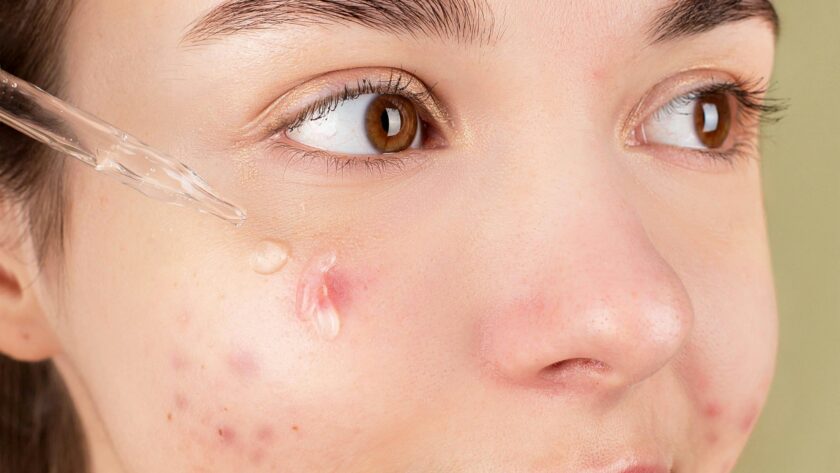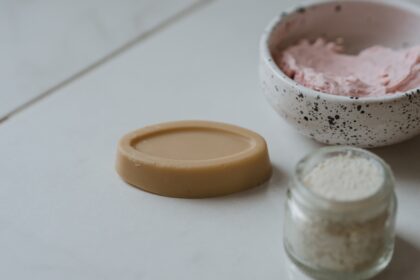Discoloration serums are skincare products designed to address issues related to skin discoloration, hyperpigmentation, and uneven skin tone. Skin discoloration can be caused by various factors, including sun exposure, hormonal changes, acne scars, and aging. These serums typically contain active ingredients that work to reduce the appearance of dark spots, uneven pigmentation, and other skin tone irregularities.
Common ingredients found in discoloration serums include:
- Vitamin C: Known for its brightening properties, Vitamin C helps inhibit melanin production, reducing the appearance of dark spots and promoting a more even skin tone.
- Alpha Arbutin: This is a skin-lightening agent that helps reduce the appearance of hyperpigmentation.
- Niacinamide (Vitamin B3): Niacinamide has anti-inflammatory properties and is known to improve the appearance of dark spots and uneven skin tone.
- Licorice Extract: Licorice contains compounds that may help lighten dark spots and even out skin tone.
- Retinol (Vitamin A): Retinol promotes cell turnover, which can help fade dark spots and reveal newer, more evenly pigmented skin.
- Hyaluronic Acid: While not directly involved in treating discoloration, hyaluronic acid is often included to provide hydration and improve overall skin texture.
Who should use Discoloration Serum ?
Discoloration serums are generally suitable for individuals who have concerns related to skin discoloration, hyperpigmentation, and uneven skin tone. Here are some common reasons why someone might consider using a discoloration serum:
- Dark Spots: If you have dark spots on your skin, whether they are due to sun damage, acne scars, or other causes, a discoloration serum may help reduce their appearance.
- Hyperpigmentation: Uneven pigmentation, where certain areas of the skin are darker than others, can be addressed with the use of discoloration serums.
- Sun Damage: Exposure to the sun’s harmful UV rays can lead to discoloration and sunspots. Using a serum with ingredients like Vitamin C can help mitigate the effects of sun damage.
- Aging: As we age, the skin may develop age spots and an uneven complexion. Discoloration serums with ingredients such as retinol can help improve skin texture and tone.
- Post-Inflammatory Hyperpigmentation (PIH): If you’ve experienced inflammation or trauma to the skin (such as acne), it can leave behind dark spots. Discoloration serums can be beneficial in fading these marks.
- Uneven Skin Tone: Individuals with an uneven skin tone, where different parts of the face or body have varying pigmentation, may benefit from the use of discoloration serums.
List of the well-known brands which has effective discoloration serums:
There are several skincare brands that are well-known for producing effective discoloration serums. Keep in mind that individual results may vary, and it’s essential to choose products based on your specific skin type and concerns. Here are some reputable brands that are often associated with high-quality discoloration serums:
- Skinceuticals: Skinceuticals offers a range of skincare products, including serums targeting discoloration. Their “CE Ferulic” serum, which contains Vitamin C, is popular for brightening and addressing uneven skin tone.
- Paula’s Choice: Paula’s Choice is known for evidence-based skincare, and they offer serums with ingredients like Vitamin C, niacinamide, and other skin-brightening agents to address discoloration issues.
- Murad: Murad’s Rapid Age Spot and Pigment Lightening Serum is designed to fade dark spots, age spots, and freckles. It often contains ingredients like hydroquinone and glycolic acid.
- La Roche-Posay: La Roche-Posay is a French skincare brand that produces a variety of dermatologist-tested products. Their Mela-D Pigment Control Glycolic Acid Serum is formulated to reduce the appearance of dark spots.
- SkinMedica: SkinMedica’s Lytera 2.0 Pigment Correcting Serum is known for addressing skin discoloration and promoting a more even skin tone.
- Clinique: Clinique offers the Even Better Clinical™ Radical Dark Spot Corrector + Interrupter, which aims to reduce the appearance of dark spots and hyperpigmentation.
- Kiehl’s: Kiehl’s Clearly Corrective Dark Spot Solution is a serum formulated with Vitamin C and other ingredients to target dark spots and improve skin clarity.
- Estée Lauder: Estée Lauder’s Perfectionist Pro Rapid Brightening Treatment + Ferment2 + Vitamin C targets dullness and uneven skin tone, promoting a more radiant complexion.
Who should not use discoloration serum ?
While many people can benefit from discoloration serums, there are certain individuals who may want to exercise caution or avoid using these products altogether. It’s important to note that specific recommendations can vary based on individual circumstances, and consulting with a dermatologist is advisable for personalized advice. However, here are some general guidelines on who may want to be cautious when using discoloration serums:
- Sensitive Skin: Individuals with sensitive skin may be prone to irritation or allergic reactions when using certain skincare products. It’s recommended to perform a patch test before applying a discoloration serum to the entire face.
- Allergic Reactions: If you have a known allergy to any of the ingredients in the discoloration serum, it’s crucial to avoid using the product to prevent allergic reactions.
- Pregnant or Breastfeeding Women: Some skincare ingredients, such as certain types of retinoids, may not be recommended during pregnancy or breastfeeding. It’s essential for pregnant or breastfeeding individuals to consult with their healthcare provider before using any skincare products.
- Open Wounds or Broken Skin: Avoid applying discoloration serums to areas with open wounds, cuts, or broken skin. The active ingredients in these serums may cause irritation or discomfort on compromised skin.
- Photosensitivity: Some discoloration serums contain ingredients that can increase sensitivity to sunlight, such as alpha hydroxy acids (AHAs) or retinoids. If you are not using adequate sun protection, it may lead to an increased risk of sun damage.
- Underlying Skin Conditions: Individuals with certain skin conditions, such as eczema or psoriasis, may need to be cautious when using discoloration serums, as these conditions may already compromise the skin barrier.
- Certain Medications: If you are taking medications or undergoing medical treatments that affect the skin, it’s advisable to consult with a healthcare professional before incorporating discoloration serums into your routine.
How people with sensitive skin should choose discoloration serum ? What should they keep in mind while choosing discoloration serum ?
For individuals with sensitive skin, it’s important to choose a discoloration serum that is specifically formulated to be gentle and suitable for sensitive skin types. Look for products that are free from harsh irritants and potential allergens. Here are some key considerations when selecting a discoloration serum for sensitive skin:
- Hypoallergenic Formulas: Look for discoloration serums that are labeled as hypoallergenic, meaning they are less likely to cause allergic reactions.
- Fragrance-Free: Fragrances can be irritating for sensitive skin, so opt for products that are fragrance-free or formulated without synthetic fragrances.
- Gentle Ingredients: Choose serums with gentle active ingredients that target discoloration without causing irritation. Some suitable ingredients for sensitive skin include:
- Niacinamide (Vitamin B3): Known for its anti-inflammatory properties and suitability for sensitive skin.
- Licorice Extract: Helps brighten skin tone and is often gentle on sensitive skin.
- Azelaic Acid: Known for its anti-inflammatory and brightening properties.
- Gentle Forms of Vitamin C: Look for stabilized and less irritating forms of Vitamin C, such as sodium ascorbyl phosphate or ascorbyl glucoside.
- Alpha Arbutin: A milder alternative to hydroquinone, known for brightening dark spots.
- Avoid Harsh Ingredients: Steer clear of products that contain potentially harsh ingredients, such as high concentrations of alpha hydroxy acids (AHAs), beta hydroxy acids (BHAs), or strong retinoids, unless specifically recommended by a dermatologist.
- Patch Test: Always perform a patch test before applying the serum to your entire face. Consider applying a small amount of the product to check for any adverse reactions on any other part of your skin.
- Consult with a Dermatologist: If you have concerns about discoloration and sensitive skin, it’s advisable to consult with a dermatologist. They can recommend specific products based on your skin type and address any underlying skin issues.
When using discoloration serums, it’s important to follow the product instructions, apply sunscreen during the day (as some of these ingredients may increase sensitivity to the sun), and be patient, as results may take time. It’s also advisable to perform a patch test before incorporating any new skincare product into your routine to check for any adverse reactions. If you have specific concerns about your skin, it’s a good idea to consult with a dermatologist for personalized advice.




